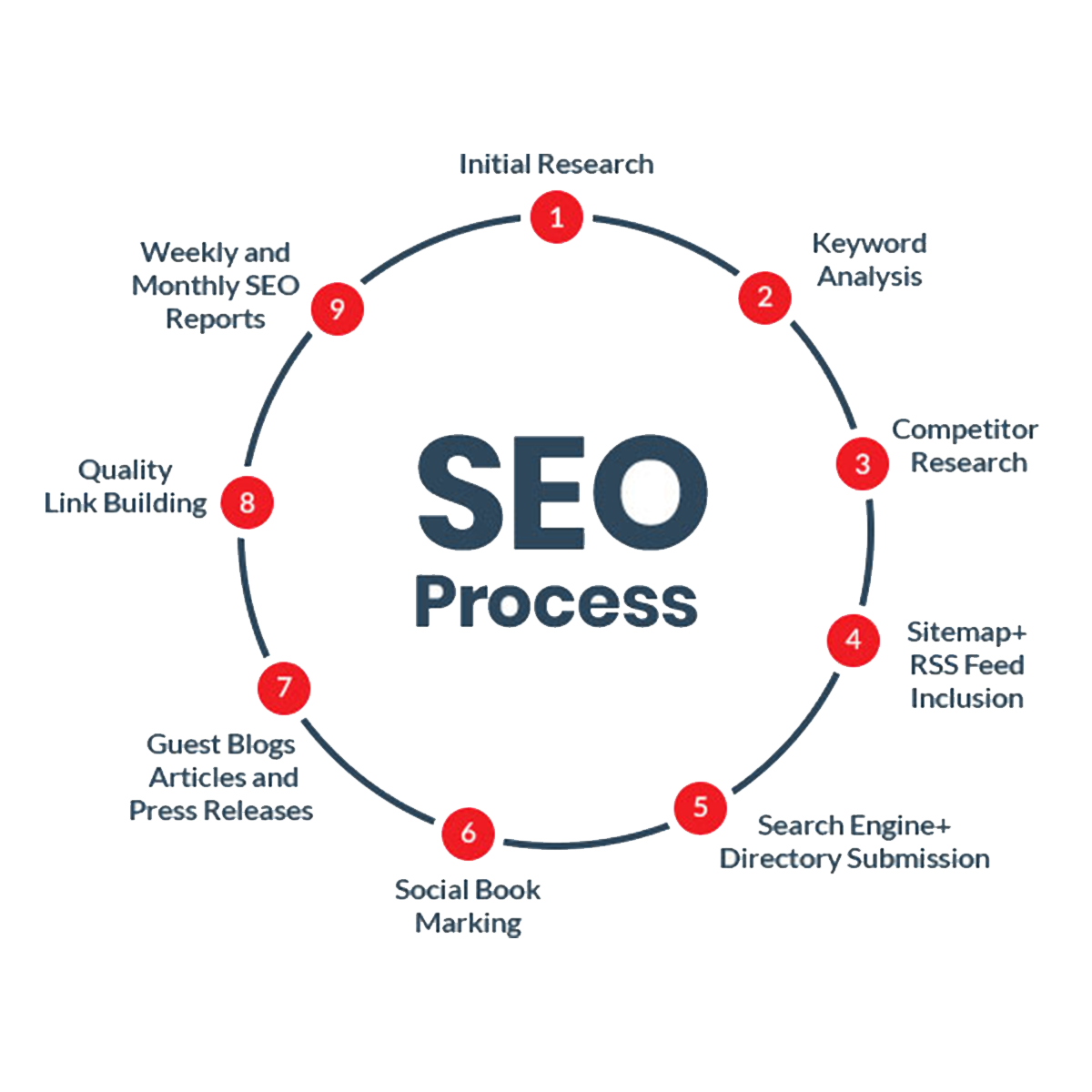Why Choose Us for SEO Services?
Tailored SEO Strategies: Every business and its SEO needs are unique. We craft custom SEO plans tailored to your industry, target audience, and business goals, ensuring you get results that matter.
Comprehensive SEO Solutions: From keyword research and on-page optimization to technical SEO and link-building, we cover every aspect of search engine optimization to help your business thrive.
Data-Driven Approach: Our SEO experts leverage advanced analytics and tools to track performance, identify opportunities, and continuously refine your strategy for optimal results.
Local SEO Expertise: Looking to dominate the local market? We specialize in local SEO strategies that help your business stand out in Delhi NCR and attract nearby customers.
Proven Results: With a track record of improving search rankings and driving traffic for businesses across various industries, we have the expertise to deliver measurable results for your business.

What We Offer: Our SEO Services
Keyword Research & Strategy: We identify your business's most relevant and high-impact keywords to help you rank for terms your audience is actively searching for.
On-Page SEO: From optimizing meta tags to improving content structure, we ensure every element of your website is search-engine-friendly.
Technical SEO: Our team handles everything behind the scenes, including site speed, mobile responsiveness, and crawlability, to enhance your website's technical performance.
Content Optimization: Engaging, SEO-rich content is at the heart of every successful strategy. We optimize your content to drive traffic and engage your audience.
Link Building: Quality backlinks are essential for boosting authority. We create a strong backlink profile through ethical and strategic outreach.
Local SEO: We put your business on the map—literally. From Google My Business optimization to local keyword targeting, we help you capture nearby audiences
SEO Audits & Reporting: Transparency is key. Our detailed reports and audits give you insights into your performance and the impact of our efforts

Our Process
In-depth Analysis: To identify opportunities and challenges, we conduct a detailed audit of your website, competitors, and industry.
Custom Strategy Development: Based on our findings, we create a tailored SEO strategy designed to meet your business goals.
Implementation: Our team gets to optimize your website, create high-quality content, and build links to improve your rankings.
Monitoring & Optimization: SEO is an ongoing process. We continuously monitor performance, make adjustments, and keep you updated with regular reports.
Results-Driven Growth: Our ultimate goal is to increase your website traffic, enhance brand visibility, and drive business growth.

Why We're the Best SEO Company in Delhi NCR
At ThaverTech, we don't just aim to improve your rankings—we're committed to delivering a complete SEO experience that transforms your online presence. Here's why businesses trust us:
- Expertise in the latest SEO techniques and trends.
- A team of passionate professionals dedicated to your success.
- Transparent reporting and measurable results.
- Customized solutions tailored to your unique needs.
When you partner with us, you're not just hiring an SEO agency—you're gaining a long-term partner focused on your growth.

Let's Take Your Business to the Top of Search Results
Ready to dominate search engine rankings and attract your target audience? Trust the best SEO company in Delhi NCR to deliver results that matter. Contact Thavertech today and let us help you grow your business with expert SEO strategies!
Boost your visibility. Drive organic traffic. Outrank the competition.
FAQ
-
Why should I choose Thavertech for SEO services?
At Thavertech, we offer tailored SEO strategies to meet your business's unique needs. We provide comprehensive services, including keyword research, on-page SEO, technical SEO, link-building, and local SEO expertise. Our data-driven approach ensures your business thrives in the competitive digital landscape.
-
What is the process behind your SEO services?
We begin with an in-depth analysis of your website and competitors, followed by creating a custom SEO strategy. Our team then implements the plan, optimizing your website and content. We continuously monitor performance, adjust, and provide regular reports to ensure measurable growth.
-
How do you improve my website's search rankings?
We focus on various aspects of SEO, including keyword optimization, technical SEO (site speed, mobile responsiveness, crawlability), content optimization, and building high-quality backlinks. We aim to enhance your website's authority and make it more visible in search results.
-
Can you help my business with local SEO?
We specialize in local SEO strategies to help businesses dominate the local market. We optimize your Google My Business profile, target local keywords, and ensure your business is visible to nearby customers in Delhi NCR.
-
What results can I expect from your SEO services?
We aim to boost your search rankings, increase organic traffic, and enhance brand visibility. Our proven strategies have helped businesses across various industries achieve tangible results, such as improved website traffic and higher search rankings on search engine results pages (SERPs).